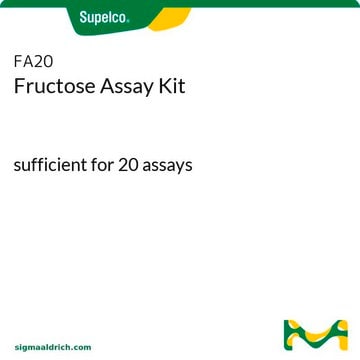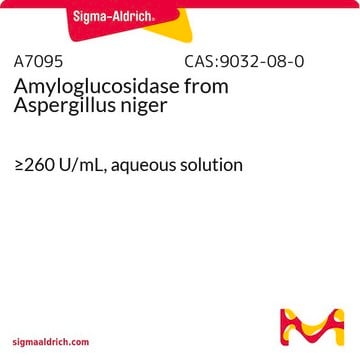G4166
Glucose Isomerase from Streptomyces murinus
≥350 U/g
Sinónimos:
Sweetzyme® IT Extra, D-xylose ketol-isomerase
Iniciar sesiónpara Ver la Fijación de precios por contrato y de la organización
About This Item
MDL number:
UNSPSC Code:
12352204
NACRES:
NA.54
Productos recomendados
biological source
Streptomyces sp. (S. murinus)
Quality Level
form
powder
specific activity
≥350 U/g
storage temp.
2-8°C
General description
Immobilized glucose isomerase produced from a selected strain of Streptomyces murinus.
Application
Glucose Isomerase from Streptomyces murinus has been used to isomerize xylose to xylulose during the production of dihydrogen from Xylose. It has also been used in the synthetic enzymatic pathway for dihydrogen production from sucrose, to catalyze isomerization of glucose to fructose.
Immobilized glucose isomerase produced from Streptomyces murinus was used for the isomerization of xylose. Glucose isomerase is used in the food industry to produce high-fructose corn syrup.
Biochem/physiol Actions
Few anaerobic bacteria, fungi and plants express an intracellular metalloenzyme called D-xylose isomerase (XI). Most bacteria use the enzyme D-xylose isomerase to transform D-xylose to D-xylulose. D-Xylose isomerase (XI) converts the aldo-sugars xylose and glucose to their keto analogs xylulose and fructose.
Glucose isomerase has wide variety of industrial applications such as producing high-fructose corn syrup (HFCS) and production of ethanol from hemicelluloses. In addition, it also facilitates the study of structure-function relationships by advanced biochemical and genetic engineering techniques.
Physical properties
0.33 g yields an approximate bed volume of 1ml
Unit Definition
one unit converts glucose to fructose at an initial rate of 1 μmole per min at standard analytical conditions
Legal Information
A product of Novozyme Corp.
Sweetzyme is a registered trademark of Novozymes Corp.
Storage Class
11 - Combustible Solids
wgk_germany
WGK 3
flash_point_f
Not applicable
flash_point_c
Not applicable
ppe
Eyeshields, Gloves, type N95 (US)
Certificados de análisis (COA)
Busque Certificados de análisis (COA) introduciendo el número de lote del producto. Los números de lote se encuentran en la etiqueta del producto después de las palabras «Lot» o «Batch»
¿Ya tiene este producto?
Encuentre la documentación para los productos que ha comprado recientemente en la Biblioteca de documentos.
Los clientes también vieron
Leonardo de Figueiredo Vilela et al.
Bioresource technology, 128, 792-796 (2012-11-29)
This study presents results regarding the successful cloning of the bacterial xylose isomerase gene (xylA) of Burkholderia cenocepacia and its functional expression in Saccharomyces cerevisiae. The recombinant yeast showed to be competent to efficiently produce ethanol from both glucose and
Kripa Rao et al.
Applied biochemistry and biotechnology, 146(1-3), 101-117 (2008-04-19)
Of the sugars recovered from lignocellulose, D-glucose can be readily converted into ethanol by baker's or brewer's yeast (Saccharomyces cerevisiae). However, xylose that is obtained by the hydrolysis of the hemicellulosic portion is not fermentable by the same species of
Dominik Oberthuer et al.
PloS one, 7(6), e33545-e33545 (2012-06-08)
In this paper, we demonstrate the feasibility of using in situ Dynamic Light Scattering (DLS) to monitor counter-diffusion crystallization experiments in capillaries. Firstly, we have validated the quality of the DLS signal in thin capillaries, which is comparable to that
Molecular and industrial aspects of glucose isomerase.
Bhosale SH,et al.
Microbiology and Molecular Biology Reviews, 60(2), 280-300 (1996)
Hiroki Kitayama et al.
Biochimica et biophysica acta, 1834(12), 2640-2646 (2013-10-08)
Protein crystals form in supersaturated solutions via a nucleation and growth mechanism. The amyloid fibrils of denatured proteins also form via a nucleation and growth mechanism. This similarity suggests that, although protein crystals and amyloid fibrils are distinct in their
Nuestro equipo de científicos tiene experiencia en todas las áreas de investigación: Ciencias de la vida, Ciencia de los materiales, Síntesis química, Cromatografía, Analítica y muchas otras.
Póngase en contacto con el Servicio técnico











